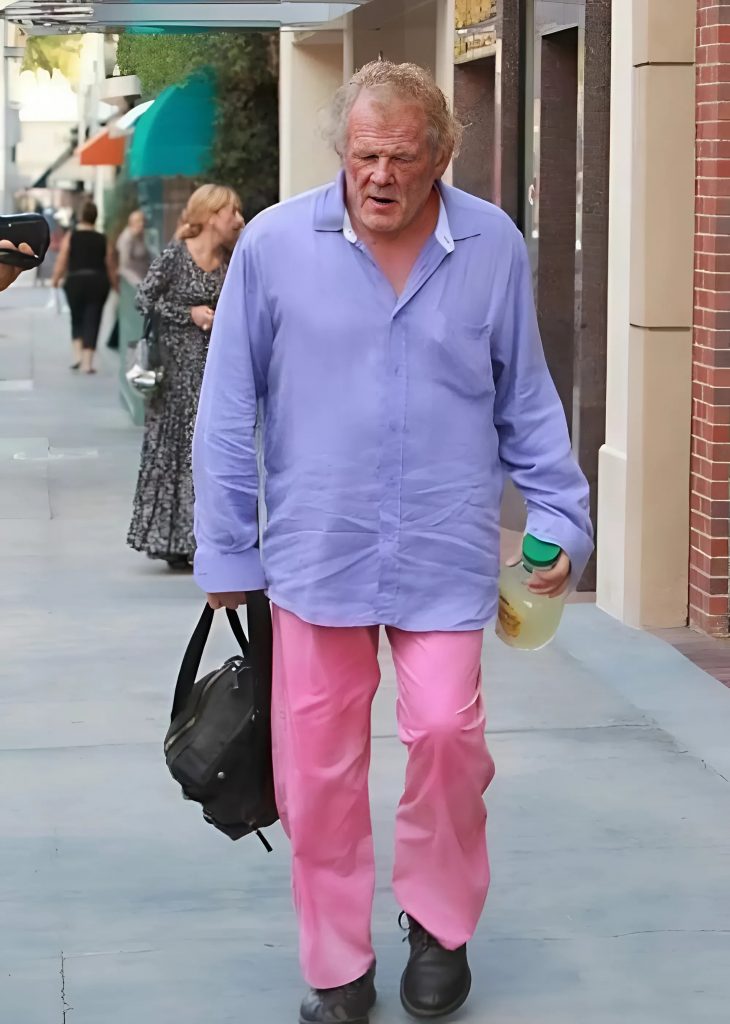In the glittering world of 1970s Hollywood, where polished looks and smooth-talking charm were the currency of stardom, one man stood out—not because he fit the mold, but because he shattered it. Nick Nolte, with his rugged features, deep-set eyes, and untamed blond mane, burst onto the screen with a raw energy that made audiences stop and watch. He didn’t look like a traditional heartthrob, yet somehow, he became one of the most compelling and unpredictable actors of his generation.
Today, at 84, Nolte lives a quiet life far removed from the red carpets and cameras. With a weathered face and white hair, he may no longer be instantly recognizable to the casual viewer. But to those who remember the golden era of cinema—and to those who value authenticity over glamour—Nick Nolte remains unforgettable.
A Breakthrough Role That Changed Everything
Nolte’s career exploded in 1976 with the groundbreaking mini-series Rich Man, Poor Man, where he portrayed Tom Jordache—a troubled working-class youth rebelling against his more refined brother. The performance was intense, visceral, and deeply human. Nolte wasn’t just acting; he embodied the emotional storm inside his character.
Despite not possessing the traditional Hollywood looks, the role catapulted him to stardom. He became a sex symbol of a different kind—gritty, masculine, and real. His fame surged, and the industry took notice: here was an actor who could not only carry a role but also transform it into something unforgettable.
A Career of Highs and Lows
The 1980s and 1990s marked the peak of Nolte’s career. He starred in hits like 48 Hrs. (opposite Eddie Murphy), Cape Fear, The Prince of Tides, Affliction, and Lorenzo’s Oil. Each performance added depth to his reputation as one of Hollywood’s most serious and committed actors.
Nolte had an uncanny ability to portray flawed, deeply human characters—men who were tough on the outside but torn apart on the inside. Whether playing a weary cop, a broken father, or a man on the edge, Nolte brought an emotional intensity that few actors could match.

But success came at a cost. Behind the scenes, Nolte battled alcoholism, drug addiction, and turbulent relationships. In 2002, his now-infamous mugshot—disheveled, glassy-eyed, hair wild—circulated across the media, symbolizing a fallen star at his lowest point. The public was shocked, but many also empathized. Nolte, the eternal outsider, had once again shown his humanity—this time, off-screen.
A Quiet Redemption
Unlike many celebrities, Nolte did not seek redemption through a flashy comeback or tabloid confessions. Instead, he chose the path of quiet dignity. He withdrew from the limelight, acted sparingly in independent films, and eventually published his candid memoir Rebel: My Life Outside the Lines, where he detailed the highs and lows of his life and career with brutal honesty.
In his book, Nolte doesn’t make excuses. He talks openly about his struggles, the damage he caused to himself and others, and his ongoing journey toward self-understanding. It’s not a redemption arc, but rather a reflection of a man who never tried to be perfect—only truthful.
Life After the Spotlight
Today, Nick Nolte is a shadow of his former on-screen persona, but in the best way possible. He lives in a modest home in Malibu, surrounded by books, plants, and family. He spends time with his children, occasionally takes on a film role if it resonates with him, and embraces his age without shame.
He no longer chases roles, appearances, or accolades. Instead, he chases meaning, opting for roles that speak to his soul, not his résumé. He has appeared in small but memorable parts in recent years, such as in the Mandalorian series, where even behind prosthetics and digital effects, his voice and presence remained unmistakable.
The Legacy of an Unconventional Star
Nick Nolte’s impact on film can’t be measured by box office numbers or awards (though he has plenty). His influence lies in how he redefined masculinity on screen. He showed that strength could coexist with vulnerability, that ruggedness didn’t have to mean emotional numbness, and that heroes didn’t always have to be clean-cut.
His work inspired countless actors to go deeper, take risks, and explore characters that are complex, conflicted, and utterly human. In an industry often obsessed with surface-level appeal, Nolte championed raw emotional truth.
